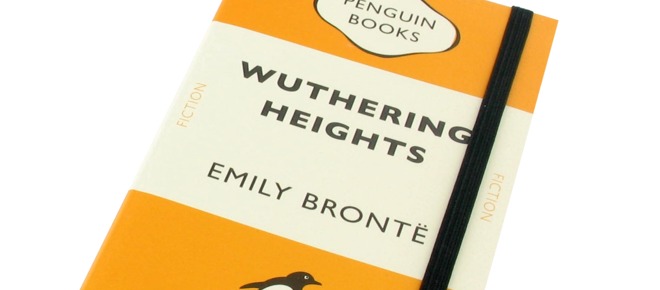 I’ve read Wuthering Heights so many times that it no longer exists as a wholly absorbing fiction for me; it’s more like a memory. Emily Brontë’s first and only novel, an indecorous riot of emotion and event conducted across the windswept Yorkshire moors, occupies a pivotal moment in the history of literature that’s worth remembering.
I’ve read Wuthering Heights so many times that it no longer exists as a wholly absorbing fiction for me; it’s more like a memory. Emily Brontë’s first and only novel, an indecorous riot of emotion and event conducted across the windswept Yorkshire moors, occupies a pivotal moment in the history of literature that’s worth remembering.
Brontë, a writer both raw and refined, is as rough on reader expectation as her characters are on each other. With Wuthering Heights, she turns the romance novel—a genre exemplified, albeit in a comic vein, by that other vicar’s daughter Jane Austen—upside down and grinds its cheerful conventions into the muddy heath with the heel of her little black boot.
Austen and Brontë not only divide the English countryside—Austen’s prose is set mainly among the favourably placed pastures of the English gentry, while Brontë’s havoc plays out in howling northern desolation—they divide readers of 19th century literature. Their novels truly reflect boundaries of temperament.
I don’t feel the same mix of affection and admiration for Pride and Prejudice, Sense and Sensibility, or even my favourite of Austen’s six novels, that lonely heart’s love dream, Persuasion. Brontë’s frontal assault on civility has all but ruined the Austen oeuvre for me. The charms of Pemberley are utterly lost once you’ve attended the lusty dogfight that is Wuthering Heights.
Ironically Brontë’s singular talent as a writer guarantees that she’ll never achieve the same measure of popular success as Jane Austen. More than 160 years after it was published, Wuthering Heights still resists successful adaptation for film or TV. That hasn’t stopped people from trying, however.
Since the 1920s, there have been more than 15 film and TV adaptations, starring every boldface name from Laurence Olivier to Ralph Fiennes. Almost all are resounding duds, damp entertainments that feel like a special Victorian episode of The Red Shoe Diaries. Though I’m reluctantly anticipating director Andrea Arnold’s upcoming film version of Wuthering Heights, past precedent is not in her favour.
The past two decades of Austen-mania, by contrast, are almost entirely owing to the convenient flexibility of her plots (courtship, conflict, and marriage) for film and TV.
Austen fever kicked off in the late 90s with the immensely popular BBC drama Pride and Prejudice starring Jennifer Ehle as the comely saucebox Elizabeth Bennet and Colin Firth as the broody Mr. Darcy. The string of Austen-inspired films that followed, and even a few of those Empire-waisted Masterpiece Theatre specials, have succeeded because they’ve purged much of what Martin Amis once referred to as Austen’s “moral austerities,” a neat way of saying they slice a meaty chunk of Jane—her voice box, specifically—out of the moving picture. It’s the absence of Austen that’s the icing on the wedding cake in these romantic confections.
Wuthering Heights, on the other hand, doesn’t actually improve when you excise its creator’s voice from the narrative. It flounders and then it dies. Aside from the novel’s challenging narrative structure—the story has two narrators, a servant, Ellen Dean, and the simpleton gentleman Mr. Lockwood—Brontë has jerry-rigged the novel with one major obstacle to popular success: there’s nothing aspirational about Wuthering Heights’ tragic love story.
Set in the early 1800s, Wuthering Heights centres on the unlikely bond between the gypsy orphan Heathcliff, taken in by the Earnshaw family as a child, and the fair and headstrong daughter of the house, Cathy Earnshaw.
If the novel is a romance, it also contains a vast store of human misery, from racism and snobbery, to alcoholism and suicide, to self-loathing and religious zealotry. The view on human nature from the moors is dark, indeed.
The real failure of Wuthering Heights, at least according to the marriage marketing scheme that’s attached to the Austen canon like a barnacle on a ship’s hull, is that Wuthering Heights isn’t a love story about how people fall in love and marry—and it sure as hell isn’t about wealthy people marrying the genteel poor. It’s concerned with the forces that keep people apart. In Heathcliff and Cathy’s case, those forces include racism and the implacable class system.
As children, Cathy and Heathcliff play at being soul mates. As they grow into young adults and assume their “rightful” places in life, their union is forbidden, if not doomed.
In wish-fulfillment terms, “love doesn’t conquer all” is a hard sell.
Translating the tragic social context of the story is small potatoes compared to the task of making Heathcliff and Cathy comprehensible to film and TV audiences. Brontë could not have created two more unappealing and compellingly vivid fictional characters than if she’d consulted the Victorian Handbook of Psychological Disorders and then drowned a litter of kittens.
The adult Heathcliff is such a pitiless, unremitting bastard he makes Humbert Humbert look like Joe Gargery by comparison. Cathy isn’t much better. For some readers (not this one, however) she’s the least appealing figure. Quick to anger—she hauls off and slaps more than one character—she’s as complete a female mess as ever set down in type. Few readers forgive her decision to marry the genteel Edgar Linton, a fair-weather cousin of Austen’s Mr. Darcy, rather than Heathcliff. But given the success of Sex and the City, I wonder why her reasoning—she can’t marry the impoverished Heathcliff because the union would render them both “beggars”—is so hard to grasp.
Cruel landscape, destructive culture, loathsome characters, battering life lessons—and not a single nod to the best way to land a man—Wuthering Heights, with its authorial voice the real leading lady, manages simultaneously to be the book that you can’t stop reading and the least likely film or TV series you’ll ever want to see.